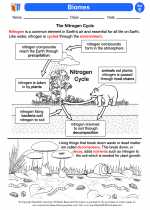Decomposition Reactions
Decomposition reactions refer to a type of chemical reaction where a single compound breaks down into two or more simpler substances. This process is the opposite of a synthesis reaction where multiple substances combine to form a new compound. Decomposition reactions can be triggered by various factors such as heat, light, electricity, or the presence of another substance.
General Form of Decomposition Reaction
A general form of a decomposition reaction can be represented as:
AB → A + B
Where AB is the original compound which breaks down into A and B, the simpler substances.
Examples of Decomposition Reactions
1. Thermal decomposition of calcium carbonate:
CaCO3 → CaO + CO2
Here, calcium carbonate breaks down into calcium oxide and carbon dioxide when heated.
2. Electrolysis of water:
2H2O → 2H2 + O2
Water decomposes into hydrogen gas and oxygen gas when an electric current is passed through it.
Factors Influencing Decomposition Reactions
Decomposition reactions can be influenced by the following factors:
- Heat: Many compounds decompose when heated to high temperatures.
- Light: Some compounds decompose when exposed to light, a process known as photodecomposition.
- Electricity: Electrolysis involves the decomposition of compounds using electricity.
- Presence of other substances: Certain substances can catalyze the decomposition of compounds.
Study Guide
To understand decomposition reactions better, consider the following study guide:
- Learn to recognize the general form of a decomposition reaction: AB → A + B.
- Study examples of common decomposition reactions and understand the conditions that trigger them.
- Explore the factors that influence decomposition reactions, such as heat, light, electricity, and the presence of other substances.
- Practice balancing decomposition reactions to ensure conservation of mass.
- Compare and contrast decomposition reactions with other types of chemical reactions, such as synthesis and combustion reactions.
By mastering the concepts and examples of decomposition reactions, you'll be able to identify and understand these important chemical processes in the world around you.
[Decomposition Reactions] Related Worksheets and Study Guides:
.◂Science Worksheets and Study Guides Fifth Grade. Plant Responses and Adaptations

 Activity Lesson
Activity Lesson
 Worksheet/Answer key
Worksheet/Answer key
 Worksheet/Answer key
Worksheet/Answer key
 Worksheet/Answer key
Worksheet/Answer key
 Vocabulary/Answer key
Vocabulary/Answer key
 Vocabulary/Answer key
Vocabulary/Answer key
